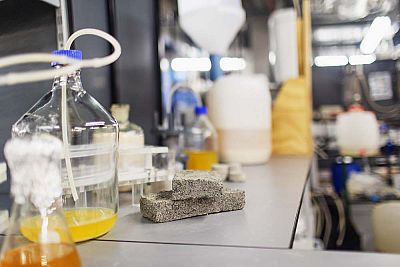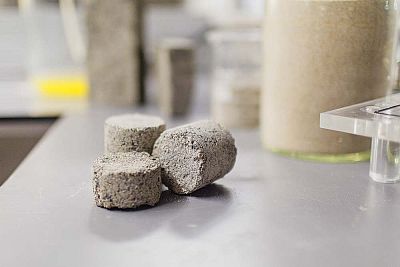"Bio-bricks" may sound icky, but scientists say they offer crucial advantages over ordinary clay bricks.
Researchers in South Africa are taking recycling to the extreme. In what they're calling a first, they've found a way to make building bricks out of human urine.
 ADVERTISEMENT
ADVERTISEMENT
 ADVERTISEMENT
ADVERTISEMENT
The bricks may sound icky, but the University of Cape Town researchers say their "bio-bricks" offer crucial advantages over the conventional clay bricks that have long been a mainstay of the construction industry.
In addition to making use of urine that otherwise would end up in waste-processing plants, the bio-brick-making process generates nitrogen and phosphorus, which can be used to make fertilizer. And while the baking process used to make clay bricks releases large quantities of the greenhouse gas carbon dioxide, bio-bricks are made at room temperature.
"My research work focuses on rethinking wastewater as a resource," Dyllon Randall, a senior lecturer in water quality engineering at the university, said in a recent interview. "Some things we discard — like urine — can actually be converted into a useful resource, as this work has shown."
To make the bio-bricks, the researchers first collected urine using a special fertilizer-making urinalinstalled in a bathroom at the university. Then they took the liquid left over after the fertilizer was removed and mixed it with sand and a strain of bacteria that produces an enzyme called urease.
Urease breaks down urea, a key component of urine, while producing a compound that binds the sand particles together to create a hard, gray-colored brick.
Suzanne Lambert, a master's student at the university and one of the bio-brick's developers, likened the process to the one marine organisms use to form coral reefs. It's "how biology has been building structures for millions of years," she said.
It takes the bio-brick mixture about a week to harden into its final shape, whether it's a cylinder or a traditional rectangle. The bio-bricks are said to pose no health risks, and while initially they give off a strong ammonia smell, the odor typically dissipates within a few days.
By varying the molds used to form the bricks and the length of time the chemical process is allowed to continue, the researchers are able to produce bricks in various shapes and strengths. "The longer you allow the little bacteria to make the cement, the stronger the product is going to be," Randall said in a statement.
It's unclear how much bio-bricks would cost to produce on a large scale. But cost might not be the only thing that could keep them from being commercially viable. "The big logistical problem that you would face is: How do you get the urine and how do you collect it?" Lambert said. "I think that would be the biggest barrier."
It takes about five gallons of urine to produce a single bio-brick — or, as the BBC reported, the amount produced in roughly 100 trips to the bathroom.
But John Locke, a New York City-based architect who has worked with similar innovations, praised the bio-bricks as an example of "new building materials and new methods of construction."
"We need to rethink what buildings are made out of, and expand what we think is possible," Locke said.












